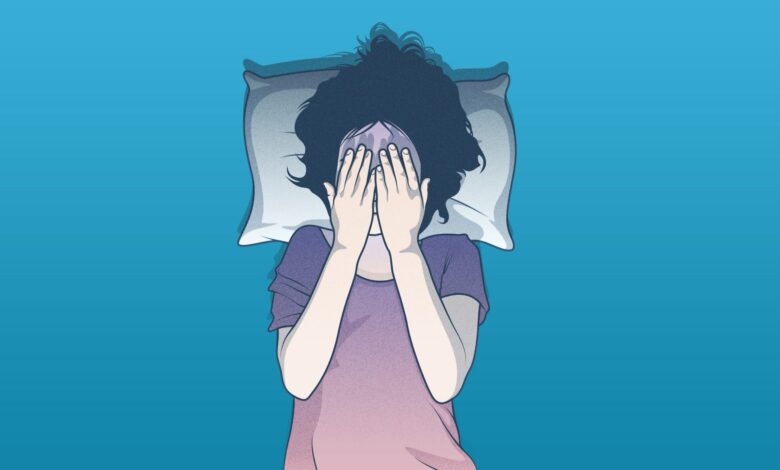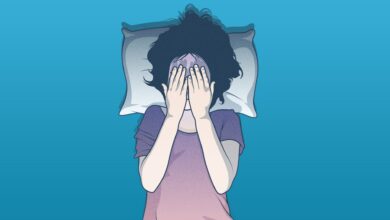Night Battles: Common and Ignored Insomnia Symptoms


Millions of individuals worldwide suffer with insomnia, a complex and widespread sleep disorder that is sometimes dismissed as a minor annoyance. Although trouble falling or staying asleep is the main symptom of insomnia, the condition can also present in other ways that affect one’s physical and emotional well-being. This article examines insomnia’s prevalent as well as underappreciated symptoms, illuminating the disorder’s complex nature and profound effects on those who experience it.
Typical Insomnia Symptoms: Trouble Sleeping
A widely acknowledged sign of insomnia is having trouble falling asleep. People might lie down for long stretches of time, unable to stop thinking about sleep. This symptom can make the issue worse because it frequently causes frustration and concern over not being able to fall asleep.
Frequently Awakening
Individuals who suffer from insomnia frequently wake up during the night. It is difficult to go back to sleep when these disruptions occur, whether they are short or long. This leads to broken sleep cycles, which keep the body from finishing necessary sleep cycles and cause general sleep deprivation.
Getting Up Too Early
Waking up too early and not being able to fall back asleep is another typical sign. This may result in less overall sleep time and insufficient recovery, which can exacerbate daily fatigue and lower alertness.
Daytime Fatigue and Sleepiness
People with insomnia often feel excessively tired and sleepy during the day due to poor quality sleep and inadequate rest. This may hinder their capacity to carry out regular duties, lower productivity, and raise the possibility of mishaps and injury.
Mood swings and irritability
A lowered stress threshold, mood fluctuations, and irritability are common outcomes of chronic sleeplessness. This can damage relationships both personally and professionally, adding to the stress and insomnia cycle.
Overlooked Insomnia Symptoms
Cognitive Deficits
Although the well-known side effect of insomnia is daytime tiredness, the cognitive deficits it produces are frequently disregarded. Decision-making, memory, and focus issues might result from insomnia. The whole quality of life, academic achievement, and work performance can all be impacted by these cognitive deficiencies.
Physical Health Concerns
Many physical health issues that are not usually directly related to sleep issues are linked to insomnia. Heart disease and hypertension are two cardiovascular disorders that can be exacerbated by chronic sleeplessness. Additionally, it may impair immunity, leaving people more vulnerable to diseases and infections.
gastrointestinal issues
Lack of sleep can have a detrimental effect on the digestive system. Gastrointestinal problems like acid reflux, stomach ulcers, and irritable bowel syndrome (IBS) can affect people who sleep poorly. These illnesses have the potential to worsen sleep disturbances, leading to a vicious cycle of pain and insomnia.
imbalances in hormones
The hormonal balance of the body can be upset by insomnia, which can result in problems including weight gain, insulin resistance, and even irregular menstruation in women. People who suffer from chronic insomnia frequently have elevated levels of the stress hormone cortisol, which can lead to a variety of metabolic abnormalities and elevated stress levels.
Diminished Pain Barrier
People who sleep less are more susceptible to pain because their bodies have a lower pain threshold. This increased sensitivity can aggravate long-term pain disorders such as arthritis and fibromyalgia, creating a vicious cycle of pain and disturbed sleep.
Disorders of the Mind
Although it is commonly recognized that mental health issues like depression and anxiety can cause insomnia, persistent sleeplessness can also play a role in the onset or exacerbation of these diseases. In severe circumstances, persistent sleep problems can raise the risk of suicide and cause feelings of hopelessness and despair.
Enhanced Social Exchanges
A person with insomnia may find it more difficult to interact positively with others, which can have an impact on social situations. Relationship tension, a decline in social activity, and social disengagement might result from the weariness and irritability that insomnia causes.
Anxiety during Performance
Individuals who have persistent insomnia may have extreme stress over their inability to fall asleep, leading to a condition known as performance anxiety. This anxiety may lead to a vicious cycle in which the fear of insomnia aggravates the disease and makes it more difficult to fall asleep.
The Effects of Sleep Disorders on Daily and Professional Lives
Being sleep deprived can have a negative effect on one’s career by decreasing output, making mistakes more likely, and making one feel less satisfied with their work in general. The cognitive deficits brought on by insomnia can include trouble focusing on tasks, poor decision-making, and a decline in creativity.
Academic Achievement
Academic performance generally declines in students who suffer from sleeplessness. The incapacity to focus, remember knowledge, and exercise critical thought can impede learning and academic achievement. Sleep may be further hampered by this if it raises tension and concern about academic success.
Individual Connections
Because insomnia causes anger, mood fluctuations, and social retreat, it can strain relationships. Insomniacs’ partners may also have trouble sleeping, which can cause shared sleep loss and heightened conflict in the relationship.
Modifications in Lifestyle
Modifying one’s lifestyle can greatly enhance the quality of one’s sleep. These include sleeping in a comfortable atmosphere, making regular physical exercise, cutting back on alcohol and caffeine, and developing a regular sleep schedule.
Stress Reduction
Stress-reduction methods like yoga, deep breathing exercises, and mindfulness meditation can be helpful since stress and worry are main causes of sleeplessness. These techniques aid in mind-calming and body-readying for sleep.
Medical Assessment
If insomnia worsens, you should contact a doctor since it may indicate underlying medical illnesses including thyroid issues, sleep apnea, or restless legs syndrome. Taking care of these issues can frequently lead to better sleep.
In summary
A complex sleep condition, insomnia can cause a wide range of symptoms beyond just trouble sleeping or staying asleep. The prevalent and often disregarded indications of sleeplessness can significantly affect a person’s physical and mental health, as well as their day-to-day existence. Effective management and treatment of insomnia depend on an understanding of its various symptoms. People can improve their general health and sleep quality by addressing both the visible and invisible symptoms, which will help them conquer the struggles of insomnia at night.








